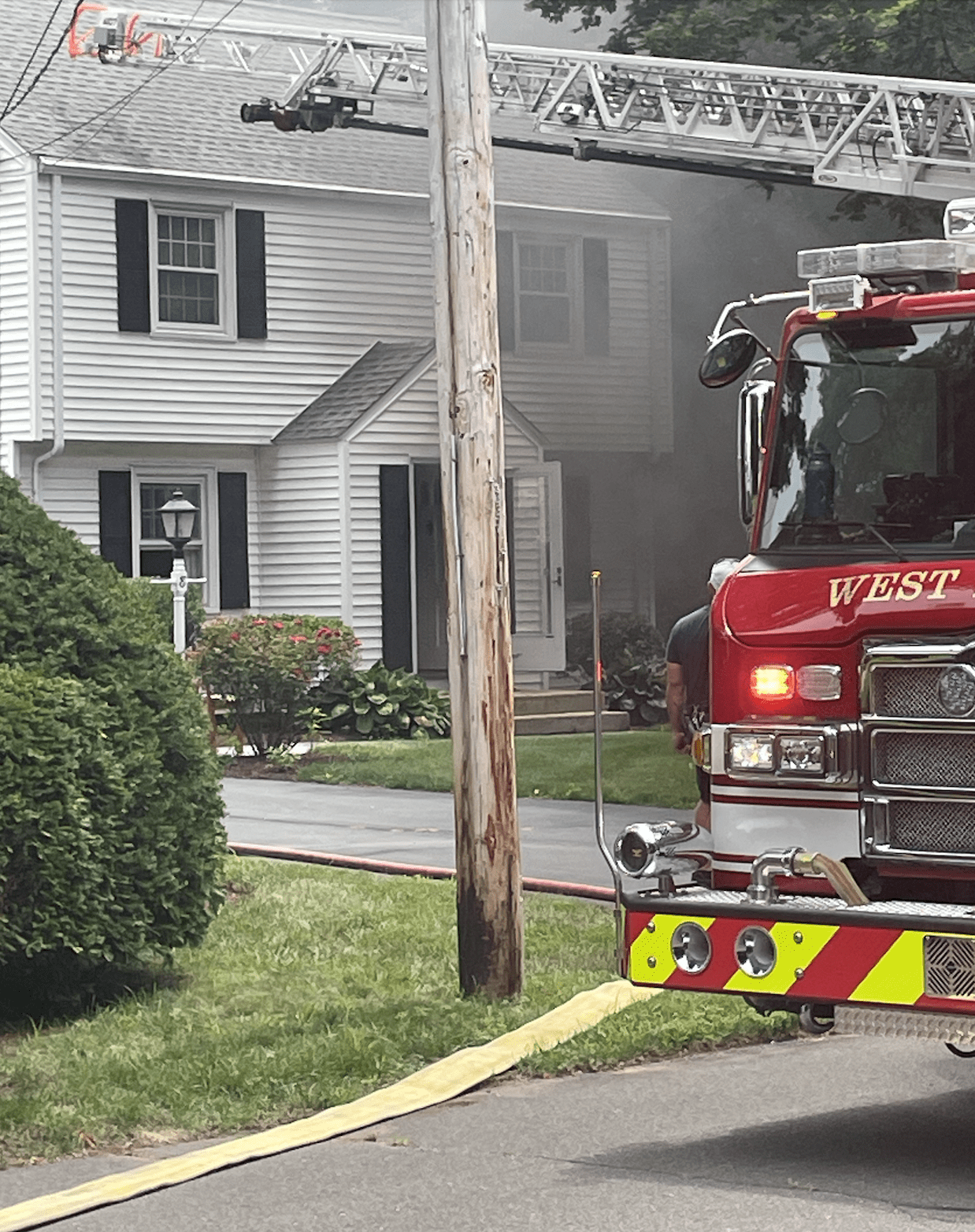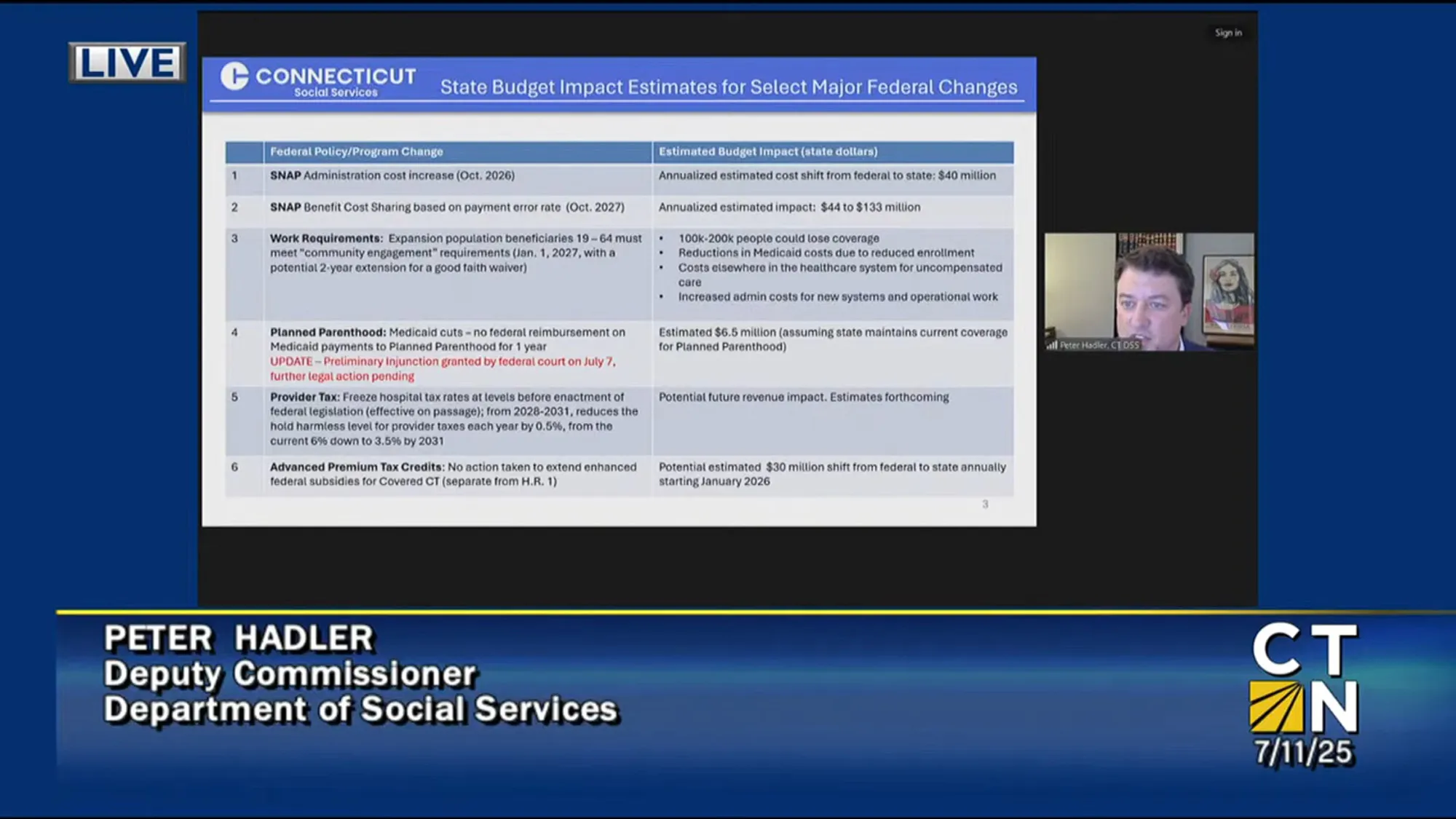A Year of COVID-19: West Hartford Leaders Reflect

Audio By Carbonatix
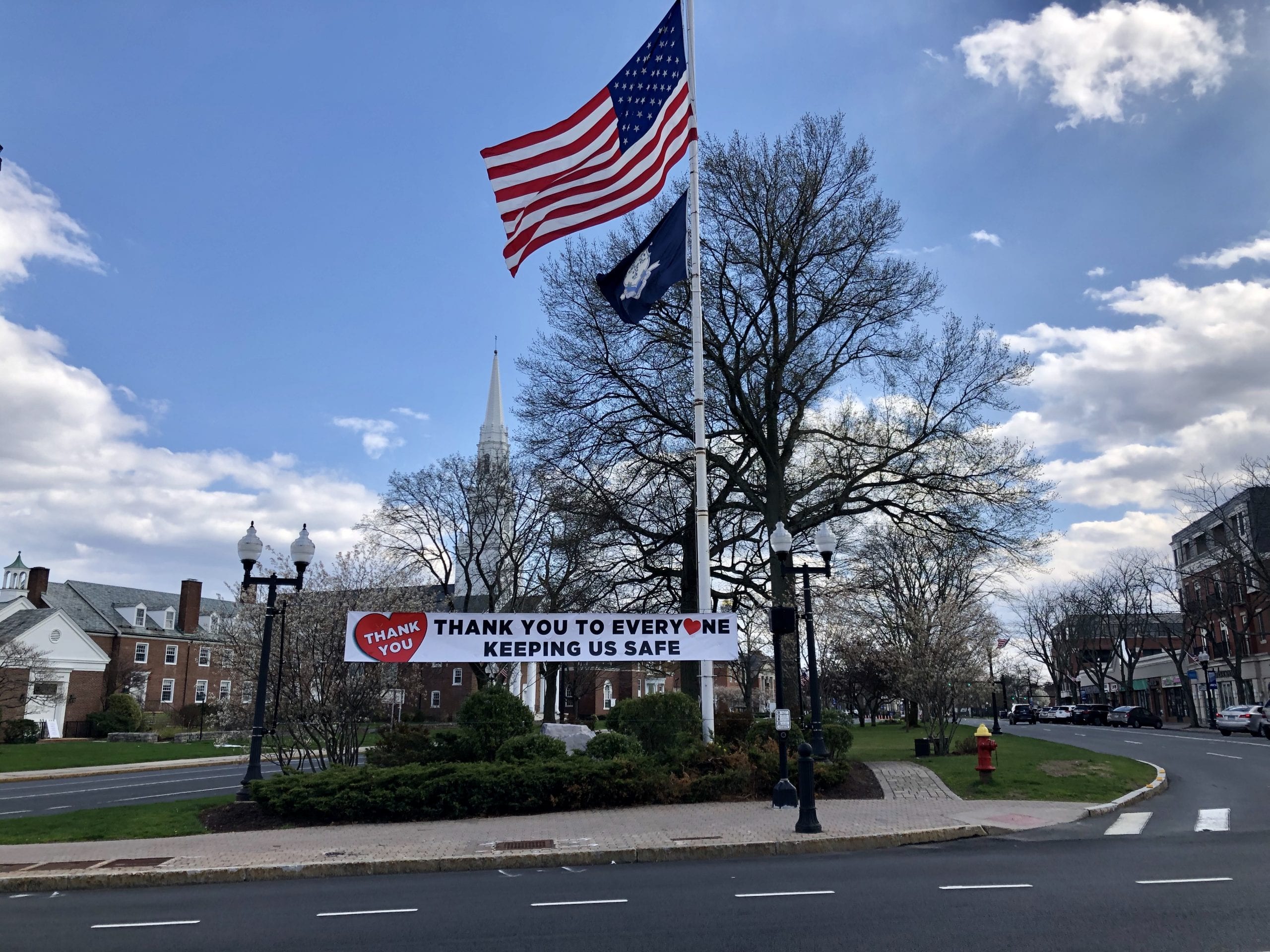
A banner hanging on West Hartford's town green in April 2020 thanks everyone for keeping each other safe. Photo credit: Ronni Newton
We-Ha.com asked town leaders – the mayor, town manager, superintendent of schools, the police and fire chiefs, and the corporation counsel – to provide some reflections on the past year, since the COVID-19 pandemic first began to impact West Hartford. [Updated]
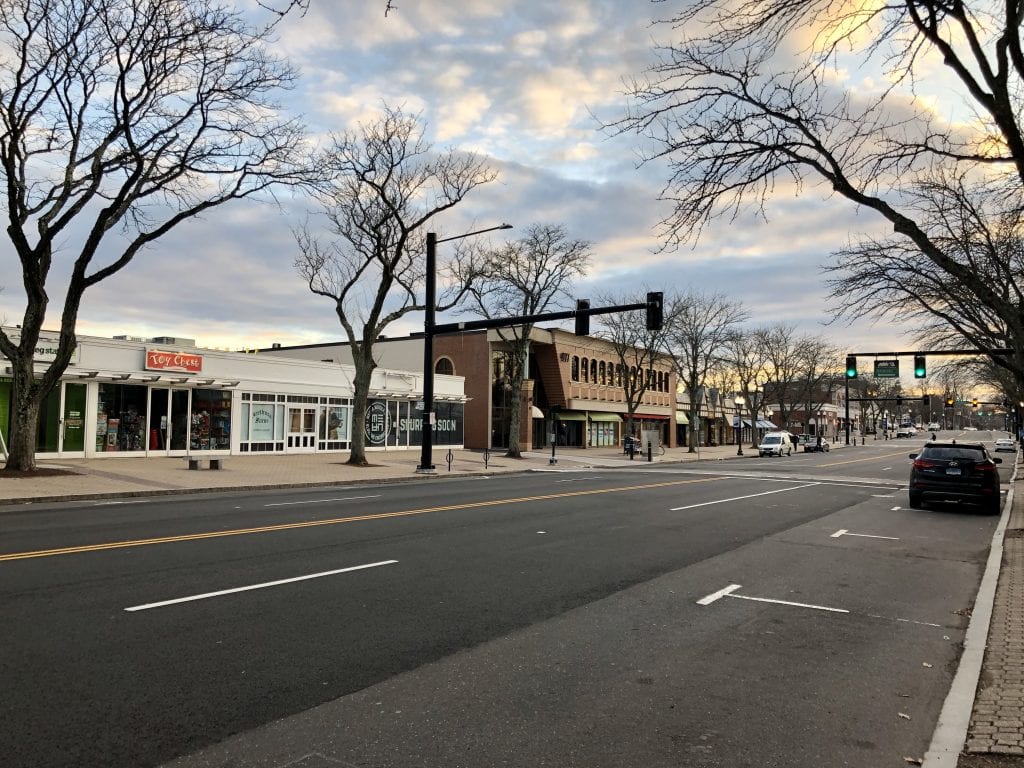
Farmington Avenue in West Hartford Center was deserted at 6:35 p.m. on St. Patrick’s Day, March 17, 2020. Photo credit: Ronni Newton
By Ronni Newton
West Hartford Mayor Shari Cantor declared a State of Emergency on March 15, 2020, just a few days after Superintendent of Schools Tom Moore announced that schools would close effective March 16, 2020, for an estimated two weeks.
Gov. Ned Lamont ordered non-essential businesses closed as of March 17, 2020. Restaurants, theaters, gyms, stores, offices all went dark.
That was exactly one year ago – St. Patricks’s Day – when the streets of West Hartford Center more closely resembled a ghost town than a vibrant destination in which to live, work, and play.
One year later, on March 17, 2021, West Hartford’s public secondary schools transitioned from the hybrid model into full in-person learning for all students, following the elementary schools which had resumed full in-person learning in October 2020.
Moore said Wednesday afternoon that the first day everyone was back was “excellent.” Kids and parents were happy, and many teachers emailed him to tell him how excited they were to have all of their students back together, he said.
After several spikes, the COVID-19 pandemic appears to finally be waning, and according to the most recent data released by the state, as of March 8, 2021, 27.36% of town residents have received at least one vaccine dose.
The first case of a West Hartford resident testing positive for COVID-19 was reported on March 20, 2020, and according to data released by the state on March 17, 2021, there have been 3,943 cases to date. Also according to the state, there have been 228 residents who have died of the coronavirus.
We-Ha.com asked Cantor, Moore, Town Manager Matt Hart, Fire Chief Greg Priest, Police Chief Vernon Riddick, and Corporation Counsel Dallas Dodge the same five questions about their experiences over the past year. The questions and their responses, unedited except for format, are found below.
Q: When did you start worrying about the impact COVID-19 would have on West Hartford?
Tom Moore (TM): I was actually at LAX airport in early February getting ready to board my flight back to West Hartford after a conference I had been asked to speak at, and I noticed the number of people wearing masks, as the west coast had already begun to feel the impact, at least in terms of awareness. As we saw cases in Washington state, where I have a good friend who is a superintendent, we began to meet about pandemic planning and doing “just in case discussions” about what we would do if we ever had to close schools. Obviously, what started as an intellectual exercise became critically important a few weeks later.
Matt Hart (MH): Dec 2019/January 2020
Shari Cantor (SC): I started to really worry when the NBA cancelled all of their games and an NCAA tournament game was stopped when the players were on the court and the game was abruptly cancelled. It felt like these decision makers knew more than we did about the level of risk and the seriousness of this virus. It was clear to me that this was going to impact everything – but I didn’t anticipate the degree or the length of this impact.
Greg Priest (GP): We heard a little about it in January but I think I started getting concerned circa the first few days in February when we got called to go meet with the Health District. I think this was when the reality of the situation [hit], that it wasn’t just another foreign disease that would mostly stay in the country of origin.
Vernon Riddick (VR): My concern increased when multiple COVID fatalities began occurring in New York.
Dallas Dodge (DD): One of my other clients is Stamford Hospital. In January, I was part of a small briefing with their Director of Infectious Diseases and area legislators on COVID-19. It became very clear how worried the experts were about this disease and how seriously they were taking it. In hindsight it’s amazing how accurately they predicted the danger. You could just tell in the tone that this was something the likes of which we hadn’t seen in a long, long time. That was the moment I knew this was something very serious. One of the most surreal moments for me was being at the state Capitol the day the legislative leaders reviewed the governor’s emergency declarations. I remember a large crowd gathering in one of the hearing rooms for the hearing, and wondering to myself whether it was safe for so many people to be stuffed into a room like that. That day the legislature announced the state Capitol would close for a two week “deep cleaning.” The public hasn’t been allowed back inside since.
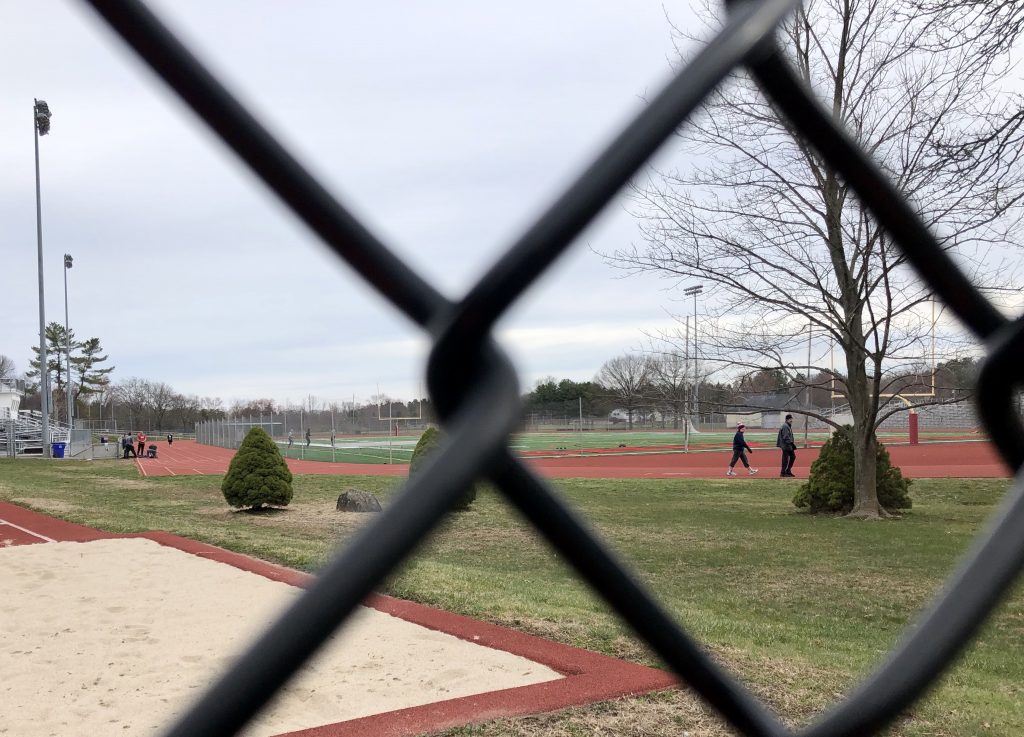
The tracks and turf fields are being closed as part of West Hartford’s efforts to restrict crowds and ensure physical distancing amid the COVID-19 pandemic. In this photo taken at the Conard track March 28, multiple groups were using the facility. Photo credit: Ronni Newton (we-ha.com file photo)
Q: What was one of the toughest decisions you had to make over the past year?
TM: The toughest decisions are always the first ones, and being out on a ledge. In one week we had day-after-day decisions where people thought we were being alarmist until the NBA announced their shutdown. That seemed to have a tremendous impact on the reality of the situation for people. But three days before we announced we were closing, I had to meet with Conard and Hall staff to tell them we were shutting down the Conard musical and Pops and Jazz the following weekend. Even with everything that followed, that might have been met with the most initial vitriol from students and parents.
MH: Laying off 130 part-time employees. Closing down our outdoor recreational assets.
SC: There were many tough decisions but in a national call with other mayors there was a statement that has stuck with me “If a decision is easy to make it is too late.” So many of the decisions we made were really difficult and hard mostly due to the fact that people didn’t understand the risks to public health. The hardest were schools and then so many businesses. Personally for me, closing the tracks at the schools was so hard. I received an email from several health care providers that were very frustrated and talked about how much they needed this resource to relieve their heavy level of stress.
GP: There have been many but the decision to re-assign staff and to re-deploy our paramedics into lighter duty vehicles comes in on the top of the list.
VR: My family and I decided not to attend the funeral of my beloved 95-year-old grandmother who died of COVID out of state.
DD: The decision to issue a municipal-level executive order last March prohibiting gatherings of 10 or more people was very difficult for town leadership. This was the first time in the history of the West Hartford that a town manager issued an executive order using his emergency powers. Obviously, we’ve now gotten used to these kinds of restrictions, but it was such an extraordinary moment. I was very confident that we were on firm legal ground, but still – this is America and the idea of restricting public assembly in any way was not something we took lightly. At the time, I think everyone was still trying to figure out how much control local authorities would have during the crisis. Neighboring towns were starting to restrict gatherings, and we were worried that if we didn’t then we would be overwhelmed with crowds. It was very clear to me that a patchwork of local rules was unworkable. Thankfully, the governor wisely issued a series of orders preempting municipalities and asserting state control over those kinds of matters.
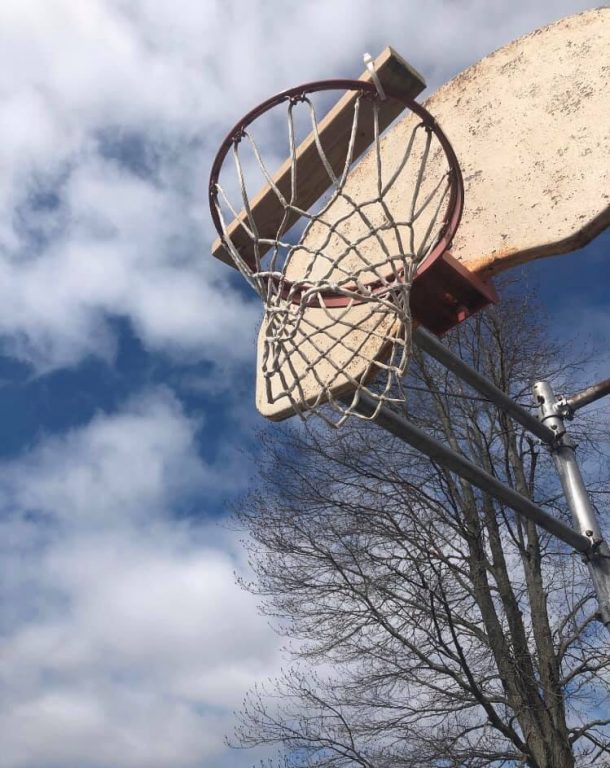
Basketball courts at town parks and schools are temporarily closed due to COVID-19, with wood blocks covering the hoops. (we-ha.com file photo)
Q: Can you think of one thing you might have done differently?
TM: I can think of a thousand things I would have done differently, because, especially as an educational leader, we have to acknowledge that we continue to learn. So many assumptions people made have not proven to be true about the virus. I think we can universally say most of us probably wish we could have the time back we spent wiping down our groceries with bleach.
MH: Kept the outdoor basketball courts open.
SC: There is so much I reflect on. As one of my colleagues said – we are building the plane as we fly it. We tried to engage the community and get the smart creative ideas, and support from the wider community. We tried to connect people but that is an area we could continue to work on. I tried to respond to so many people concerned about a wide variety of issues. It was challenging to respond to each and every person. Communication was very important as we were figuring things out, learning about the virus. I would have liked to communicate in a wider variety of ways.
GP: I would have started remote meetings with staff sooner. We went through a period of time where there was a lot of confusion and uneasiness. I think the remote meetings and the ability to see others and communicate was something that could have been helpful sooner.
VR: I would have dedicated more time to staying physically fit.
DD: In my office is a briefcase that my predecessor jokingly called “the nuclear football.” It contains all of the documents needed to run the town in the event of a catastrophic emergency – draft emergency declarations, draft executive orders, emergency purchase orders, etc. There’s even emergency supplies, including a medical kit, flashlight, and AM/FM radio. The public health emergency hit just a few months into my first term as corporation counsel, and we were still in the midst of updating and organizing all of the documents and plans in the briefcase. I would have placed a higher priority on getting that type of stuff in order. You can never be too prepared.
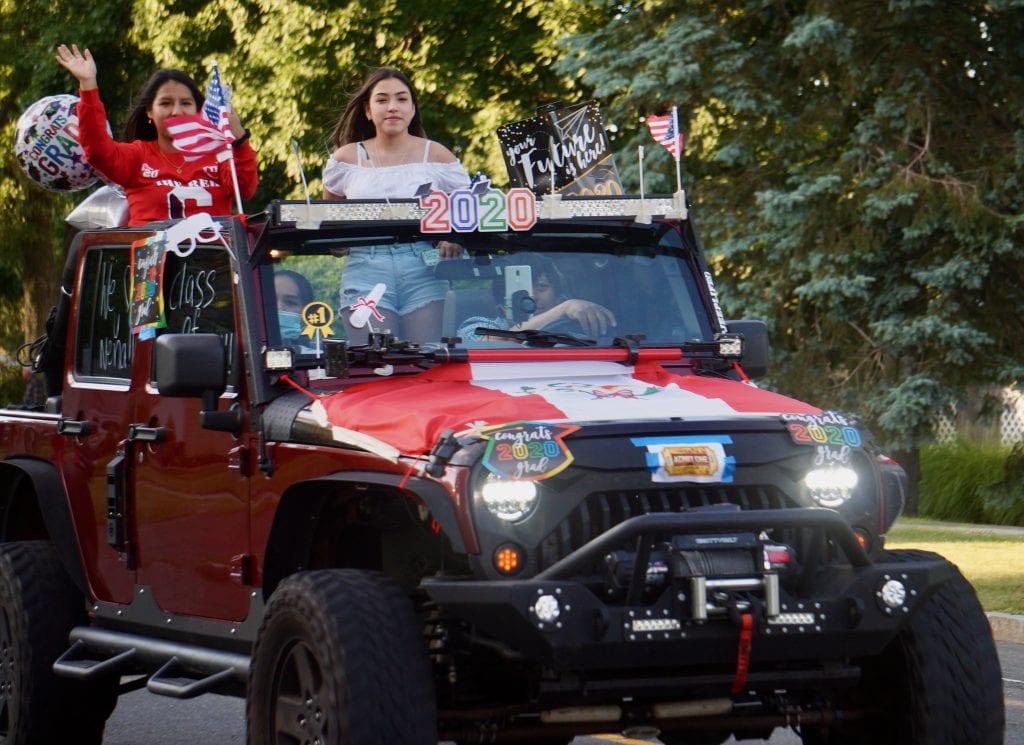
Conard High School Class of 2020 graduation parade. June 15, 2020. Photo credit: Ronni Newton (we-ha.com file photo)
Q: What is something positive that resulted from the past year?
TM: The biggest positive is always that when people come together, the impossible becomes possible. We established grab and go to keep people fed without missing any days, or interruptions, on the fly. That will go down as the thing I am most proud of for our schools, because it showed our priorities. For me personally, the graduation parades were my favorite memory from the year. My daughter was graduating, and we had heard so often that we were not doing enough, and it was not fair to our kids, but we had no choice with crowd size orders. To see the kids and families go by my house, and the joy that they had that day about being together, especially in the face of my daughter Fallon, was my favorite moment.
MH: The interdepartmental teamwork and relationships that developed between town staff and the health district. The expansion of our e-government offerings. Our outdoor dining initiative and many legislative accomplishments (e.g. passage of ADU ordinance, ordinance establishing a Civilian Police Review Board, and the approval of Pension Obligation Bonds).
SC: There were many positive moments. The community coming together in appreciation for health care workers, frontline workers, and essential workers that have shouldered so much of the burden of this pandemic. The generosity in support for the community through providing food, volunteer delivery, tech support, etc. I saw families have a renewed outdoor life –walking, cycling and hiking, making stained glass chalk designs and playing catch. Life came to a stop and families did have the opportunity to spend time in a way that our day-to-day lives before the pandemic did not. We had the opportunity to reset priorities. It allowed us to cherish and recognize how much we miss family and friends. This will hopefully give us the perspective to savor those small moments of coffee with a friend, hugs with a family or friend, in-person services, meetings, and casually bumping into community members.
GP: Our team has become far better and more robust with forward-thinking and planning. Our method of fire/EMS deployment is far more efficient than before.
VR: The resiliency and dedication of the men and woman of the West Hartford Police, sworn and civilian, was on full display as they continued to come to work every day throughout this pandemic to provide services and protection to the public.
DD: I have a 5-year-old daughter and a 7-year-old son at home. As difficult as virtual learning was last spring, and as hard as it was for them to be isolated from friends, they have bonded in a way that they never would have otherwise. They’re truly best friends. They’ve also learned how to adapt quickly to new situations, and digest serious news without becoming overwhelmed. Hopefully this generation of kids will be much stronger and more resilient for the experience.
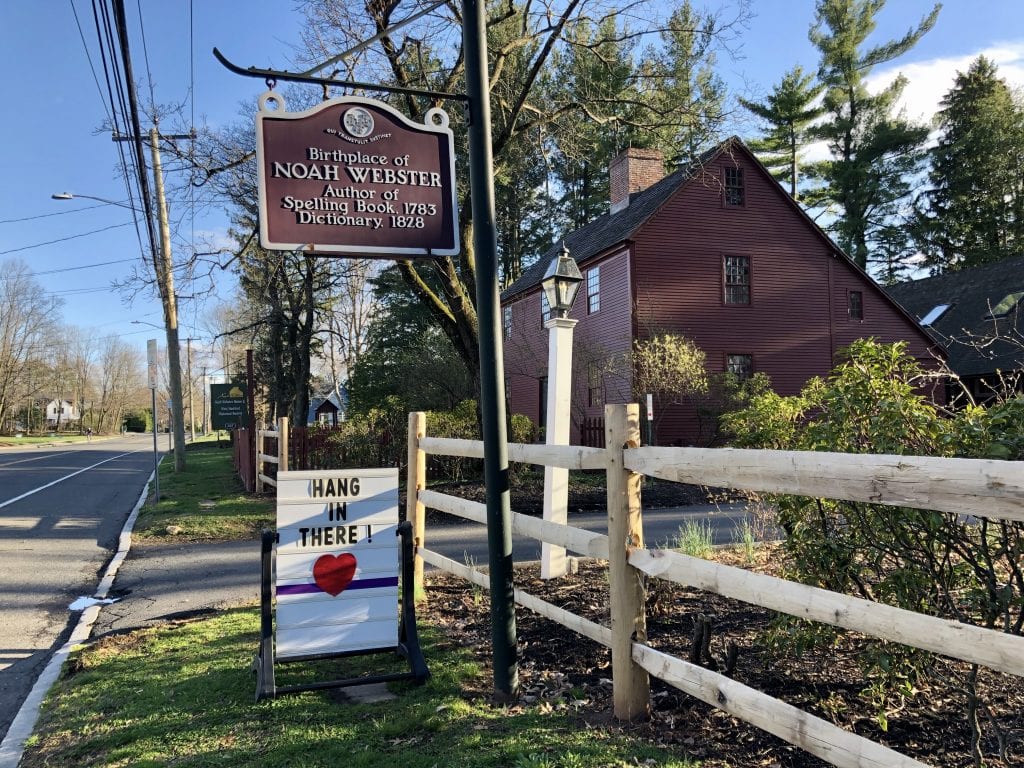
The Noah Webster House on South Main Street provided inspiring messages while it was closed in the early days of the pandemic. This sign was photographed on April 8, 2020. Photo credit: Ronni Newton
Q: What are you most looking forward to as we return to a sense of normalcy?
TM: I look forward most to seeing anxiety lessen not just in our town, but everywhere. I hope that people can relax, and begin to enjoy simple pleasures again without everything feeling like a life and death struggle that we should argue about. And I really, really, really want to be able to go to a Patriots game again!
MH: In-person meetings and interactions with colleagues and the public. Attending live baseball games with my kids! Travel!
SC: I look forward to bringing people together, encouraging community gatherings, sharing experiences, returning and adding to the vibrancy of our community. I have already seen anxiety levels relieved a little with the delivery of vaccines for older adults but I really look forward to that deeper relief and sense of safety.
GP: Not wearing a mask … which I assume is like everyone else …
VR: I am looking forward to spending time with friends and family maskless!
DD: I think we will all come out of this with a much deeper appreciation for human connection. I’m looking forward to gathering with friends and having in-person meetings again. I think a lot of public officials have appreciated the convenience of virtual meetings, but there’s simply no replacement for real human-to-human interactions.
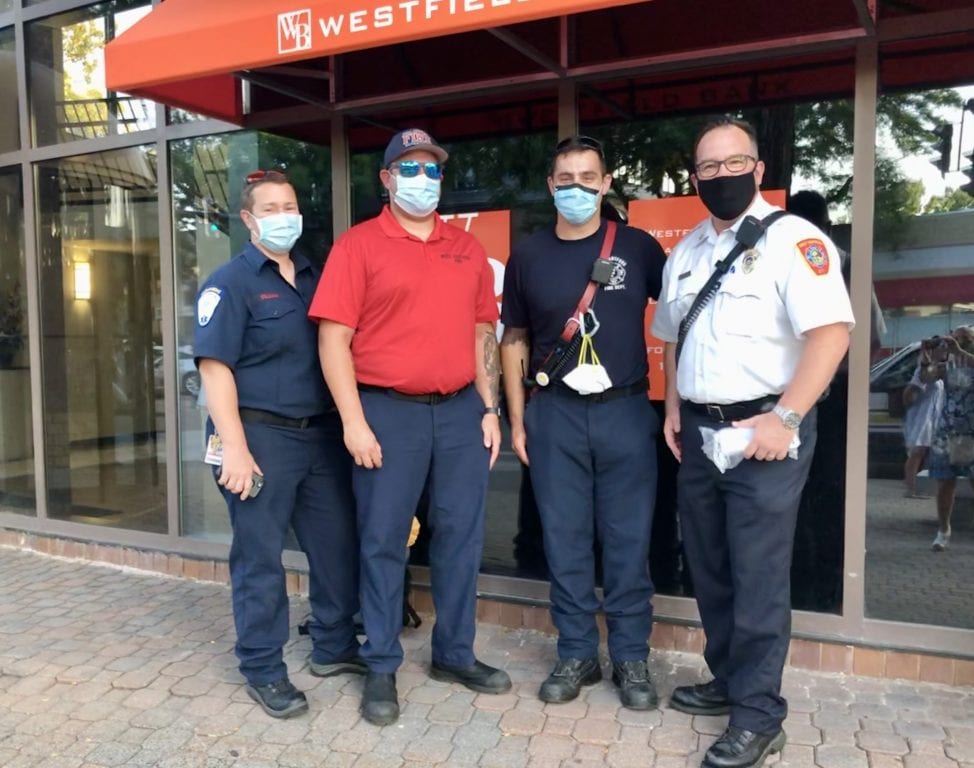
West Hartford Fire Department Bike Team and Mask Patrol. Photo credit: Ronni Newton (we-ha.com file photo)
Like what you see here? Click here to subscribe to We-Ha’s newsletter so you’ll always be in the know about what’s happening in West Hartford! Click the blue button below to become a supporter of We-Ha.com and our efforts to continue producing quality journalism.


